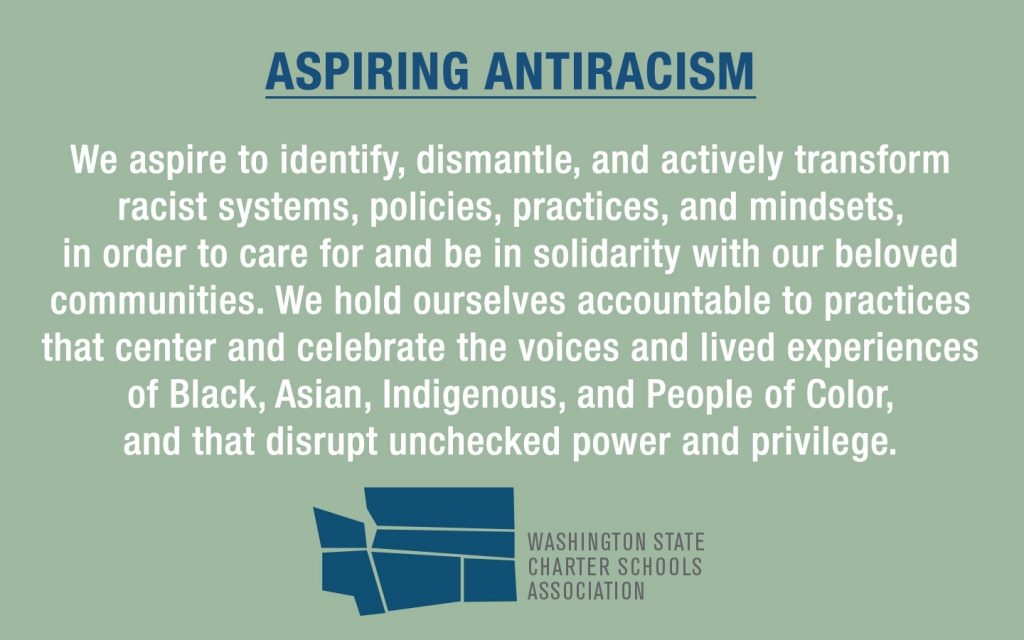The Washington State Charter Schools Association (WA Charters) has four core values: Aspiring Antiracism, Cultural Humility, Educational Justice and Collaborative Partnerships.
In this series, we will explore how these values show up in our work.

Meet Bely (pronounced Bailey) Luu, Associate Director of School Development. She currently leads the Fundraising Learning Series, a monthly mini-lesson featuring a short video from a fundraising expert or school leader sharing their tips and tricks. Read on to hear Bely’s thoughts and check out the first two videos about ethical storytelling!
Tell us about your role at WA Charters! If you could have a superpower, what would it be and why?
I serve as a fundraising coach for Washington’s charter public schools, helping schools raise the funds they need to provide innovative and student-centered education. If I could have a superpower, it would be the power to spread compassion and bring people together. We need unity and compassion in our world to solve complex and systemic issues. If we can learn to listen and build empathy, we can accomplish a lot more together.
Why do charter public schools need to raise funds?
Charter public schools nationwide and especially in Washington state do not have access to local property tax levies and facilities funding like traditional district schools. On average, the funding disparity amounts to between $1,500 and $3,000 per student, depending on the school district. Our schools have designed and implemented wrap-around services and programming to support student learning, which can add additional costs to the funding gap.
Why is mission-oriented advocacy important?
Washington’s charter public schools attract and serve a higher percentage of systemically marginalized students, including Global Majority students (aka Black, Brown, Asian, Indigenous, and students of color), students receiving special education services, and multilingual students. While traditional public schools work for many, they do not work for all students. At WA Charters, we are passionate about educational justice and want all students, especially our most marginalized students, to access high-quality, free, public school options that work for them. Together with our families, schools, and communities, we advocate for equitable state funding for charter public schools and expanding community-rooted and student-centered public schools.
What is the goal of this learning series? How is it connected to our value of ‘Aspiring Antiracism’?
The goal of the fundraising learning series is two-fold – provide equity-driven fundraising practices and expertise to help schools raise more funds and amplify Global Majority voices in the fundraising space. Unfortunately, the current fundraising “best practices” have been oppressive, exclusive, and transactional. It centers the donors as the hero versus a partner and often paints students and “underserved” communities as helpless. These practices have put wealthy white folks on a pedestal and perpetuated harmful stereotypes about the community being served. Our definition of ‘Aspiring Antiracism’ is about transforming racist systems, policies, and practices, and mindset in order to be in solidarity with our beloved community. The fundraising learning series is about disrupting what “fundraising best practices” look like and centering the voices and lived experiences of our brilliant Global Majority community.
What are the barriers of fundraising and how will this initiative address them?
Community-Centric Fundraising (CCF) said it best: “traditional ways of fundraising uphold patriarchy, classism, white supremacy and other structural oppressions.” As a woman of color working in predominantly white institutions, I have always felt uncomfortable with how the profession chases after wealthy white donors and gives them power to decide what’s best for the people we serve. The CCF movement and the Women of Color in Fundraising & Philanthropy have inspired me to stand in my power and lean into my values to center and share fundraising practices that reduce harm and advance social justice.
What is your “why” in this work? What are your hopes and dreams for education and other systems in Washington?
I have experienced first-hand the challenges of navigating an unjust school system as an immigrant and English language learner. The elementary school in my neighborhood refused to enroll me because I wasn’t “proficient” in English. I was sent to a school far away from my home to “learn English” with other Global Majority students. Then, when I was “good” enough, I was able to go back to my neighborhood school. That was just the beginning of many more micro- and macro-aggressions to come. I don’t ever want kids to feel rejected, isolated, and told they are not good enough because of the color of their skin, the languages they have yet to learn, or the neighborhood they live in. My personal experience motivates me to dedicate my career in the K-12 and higher education spaces to change the trajectory for kids. I want every child to have the support, resources, and opportunities to thrive in school and have access to an anti-racist, student-centered education that nurtures and amplifies their innate brilliance.
We bring you a conversation with Zahra Nealy about how to identify, tell, and share stories ethically. Words have power. Stories have power. Images have power. Let’s ensure storytellers have the power to accurately tell their own stories. Watch now to learn how you can put ethical storytelling to practice!
